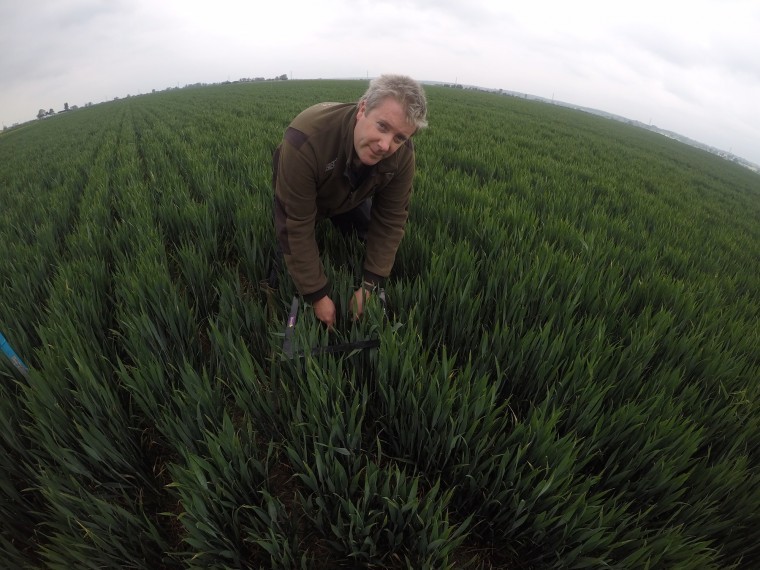Originally designed as a simple crop trial to monitor how different establishment techniques effect blackgrass, the innovative case study has evolved into a two-year project, which is now set to show farmers how machinery, technology and expert advice could come together to improve profits and overcome common industry issues.
Expertly managed by the FarmSight consultants George Whelan and Kris Romney at Burden Bros Agri, the project has seen a 33-hectare parcel of land on the Romney Marsh, Kent (kindly provided by Andrew Martin of Broad Stream Farming) with a history of blackgrass divided into four pitches. Zyatt winter wheat has been drilled at three different seed rates, 350, 400 and 450 seeds per meter square, with three different drills, a Sumo DTS, a John Deere 750A and a Väderstad Rapid.
More information about why the drills were chosen, along with the initial establishment results can be found in the April 2019 edition of South East Farmer.
{in-brief}
On 17 May, Kris Romney met with Agrovista’s agronomy and crop protection specialist Rob Purvis, who along with his colleague Andy Pendry, is scientifically monitoring and advising on the entire project. Returning to the test site, the pair took tiller counts and assessed the levels of weed establishment, predominantly focused on blackgrass.
“Two weeks ago, a lot of the blackgrass was sheltered under the wheat, but it is now very apparent to see the weeds above the canopy and it is becoming much clearer to see the difference between each of the drills,” said Kris Romney. “The equipment which has moved the most soil, the Väderstad Rapid, might have achieved the best wheat establishment rate, but it has also increased the soil to seed contact of the weed seeds and has effectively helped the blackgrass to establish well too. On the other hand, there has been little blackgrass germination in the plot which was drilled with the John Deere 750A, which is a no till drill and causes minimum disturbance to the soil.”
The tiller counts have also been completed. Currently the John Deere appears to have the highest count, however the FarmSight team are aware that with more tillers, more nutrients will be required to produce quality grain, and so overall conclusions will not be made until after harvest when yield and crop quality have been measured.
The project will also be drawing on other data, such as disease pressure, to fully assess which establishment technique has the overall most positive impact on the bottom line. In the long-term, the trial is aiming to look much further than which drill works best in the field and the FarmSight team is hoping to use the Total Crop Solutions concept to help farmers harness the power of 21st century technology and expert advice to improve profits.
“The current trial is all about crop establishment, the comparable costs and the end difference in yield and quality,” said George Whelan, “but the Total Crop Solutions concept as a whole is much bigger than that. We want to help customers make the right decisions and to show them what is possible when combining the right machinery, technology and expertise. We are here to support them while also finding solutions to industry wide challenges, such as input costs and blackgrass. It is about much more than tractor and equipment sales; we want to go further to help our customers unlock the potential of their field.”




